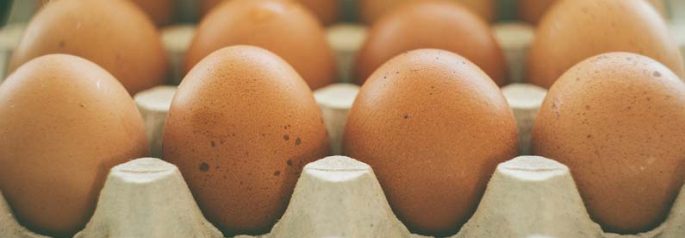
Egg lovers are rejoicing this week because the USDA, usually the last to notice anything resembling a genuine nutritional advance, has announced that eggs are much higher in vitamin D than previously thought, and also 14 percent lower in cholesterol than previously believed.
Leaving aside for the moment the question of how it is that scientific authorities could have been so wrong for so long about something as basic as the levels of vitamin D and cholesterol in eggs, the new numbers are happy news indeed for egg lovers. The egg industry is delighted to report that you can now eat up to 10 eggs a week and still stay under the recommended limit of 300 mg of cholesterol per day for healthy adults (provided, of course, that you consume no other cholesterol at all from any other source).
This is putting a sunny-side-up grin on the face of those who enjoy eating eggs and don’t fancy eating their way to a heart attack. But if it’s making egg-lovers smile, it’s like mainlining Prozac for the egg industry, which as you might expect is wasting no time trumpeting the news that their products have been exonerated.
But wait a minute. There’s something that’s being overlooked in all the hoopla, something that might be even more important than the milligrams of cholesterol in an egg. Do we care how the hens are treated? About the kind of conditions in which they live, and the quality of the food they are fed? Do we care if the eggs are produced humanely and sustainably? If the new dietary information means we’ll be eating more eggs that come from sick hens who live in abject misery, is this such a good thing?
As I wrote in “The Food Revolution”, the sad fact of modern industrialized egg production is that layer hens are crammed together in filthy cages so small that the birds are not able to lift a single wing. The amount of space the birds are given is less than they would have if you stuffed several of them into a file drawer. One building will frequently house 30,000 hens packed together under these grotesquely crowded and seriously unhealthy conditions.
The birds are driven so insane by these miserable conditions that they would peck each other to death if they could. The industry, of course, doesn’t want to see such a thing happen, because there’s no profit to be made from dead hens who don’t lay eggs. How, then, does the industry prevent it? Not by giving the hens more room, which would be the humane response, but by cutting off a sizable part of the hens’ beaks, a process known euphemistically as “beak trimming.”
What’s a concerned consumer to do? Fortunately, the Cornucopia Institute has come out with an “Organic Egg Scorecard” that empowers consumers with accurate information. The scorecard rates companies that sell name-brand and private-label organic eggs, according to the criteria that are most important to the majority of conscientious consumers.
There are two things the Organic Egg Scorecard quickly makes apparent.
The first is that just because eggs are “organic” doesn’t mean they are humanely raised. In fact, there are “organic” factory farm operations with more than 80,000 “organic” hens in a single building.
The second thing the Organic Egg Scorecard reveals is exactly which brands of eggs found in your local stores are produced using the best organic practices and with the most ethical regard for the hens. If you are interested in which eggs are sustainable and humane, and which are not, check it out.
The results may surprise you. For example, the private label brands sold by Trader Joe’s, Safeway O Organics, Whole Foods 365 Organic, WalMart’s Great Value and Costco’s Kirkland Signature, get the lowest possible rating. This is because these companies were unable or unwilling to provide any meaningful information about how their chickens are housed, fed or treated. Unfortunately, reports the Cornucopia Institute, “the vast majority of organic eggs for private label brands are produced on industrial farms that house hundreds of thousands of birds and do not grant the birds meaningful outdoor access.”
Many egg suppliers tout that their eggs are produced without hormones. That sounds great but is in fact meaningless, because unlike beef and dairy products, no eggs produced in the U.S. today are legally produced with hormones. Federal regulations prohibit the use of hormones in raising poultry.
Whole Foods, at least, has taken a step in the right direction by not selling any eggs that come from hens whose beaks have been “trimmed.” Whole Foods shoppers can take a modicum of comfort in knowing that eggs bought there do not come from the worst of the nation’s egg factories.
If you want the eggs from healthy and happy hens, you might want to take a step in the direction of food self-reliance and keep a few hens in your backyard. Or get your eggs from a neighbor or from a small-scale farm you can actually visit. Or purchase only those eggs which are highly rated by the Organic Egg Scorecard.
Personally, my favorite breakfast is guaranteed to be cruelty-free. It’s oatmeal, with cinnamon, raisins and walnuts, which aren’t added only for flavor. Oats are a comparatively low-glycemic index grain to begin with, but the addition of walnuts creates a nourishing breakfast with high protein content, high nutrient density, a healthy form of fat, and a very low glycemic index.
Here’s my recipe for a tasty and hearty breakfast that will provide you with consistent blood sugar levels, and give you plenty of energy all morning. Serves three.
1 cup rolled oats
3 cups water
1/2 teaspoon salt
1/2 teaspoon cinnamon
1/3 cup raisins
1/3 cup walnuts
1. Place oats, water, salt, cinnamon and raisins in a covered saucepan and bring to a boil.
2. Turn down heat and simmer for 10 minutes, stirring occasionally.
3. Remove from heat, stir in walnuts and serve hot.

